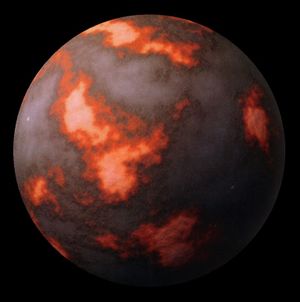Difference between revisions of "Iridonia"
Bithan Reist (talk | contribs) |
|||
| (One intermediate revision by one other user not shown) | |||
| Line 1: | Line 1: | ||
{{Infobox Planet | {{Infobox Planet | ||
| name = Iridonia | | name = Iridonia | ||
| − | | image = | + | | image = [[File:Iridonia.jpg|thumb|Iridonia]] |
| system = Iridonia system | | system = Iridonia system | ||
| sector = Glythe sector | | sector = Glythe sector | ||
| galcoord = (-73, 220) | | galcoord = (-73, 220) | ||
| syscoord = (5, 6) | | syscoord = (5, 6) | ||
| + | | Suns = 1 | ||
| + | | Moons = 2 | ||
| rotation = | | rotation = | ||
| orbital = | | orbital = | ||
| Line 19: | Line 21: | ||
}} | }} | ||
| − | Iridonia is the homeworld of the Zabrak species. Due to the harsh living conditions, the Zabrak are a hardy species. They took to flight and then space travel as soon as they could develop the technology, and by the time the Duros encountered them, they had already colonized five systems. | + | Iridonia is the homeworld of the Zabrak species. Due to the harsh living conditions, the Zabrak are a hardy species. They took to flight and then space travel as soon as they could develop the technology, and by the time the Duros encountered them, they had already colonized five systems.<ref name="SWwikiI">[http://www.http://starwars.wikia.com/wiki/Iridonia Iridonia on Wookieepedia]</ref> |
| + | |||
| + | |||
| + | ==References== | ||
| + | {{reflist}} | ||
| + | [[Category:Planets]] | ||
Latest revision as of 23:59, 22 September 2015
| Iridonia | |
| Location | |
| System | Iridonia system |
| Sector | Glythe sector |
| Galactic Coordinates | (-73, 220) |
| System Coordinates | (5, 6) |
| Astrographic Entry | |
| Statistics | |
| Type | temperate/breathable |
| Primary Terrain: | |
| Rotational Period | |
| Orbital Period | |
| Population | 1,279,592 inhabitants |
| Control | |
| Controlled By | Darkness |
| Governor | None |
| Magistrate | None |
| Sentient Races | Zabrak |
Iridonia is the homeworld of the Zabrak species. Due to the harsh living conditions, the Zabrak are a hardy species. They took to flight and then space travel as soon as they could develop the technology, and by the time the Duros encountered them, they had already colonized five systems.[1]
